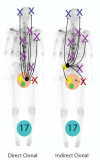Copy number analysis indicates monoclonal origin of lethal metastatic prostate cancer
- PMID: 19363497
- PMCID: PMC2839160
- DOI: 10.1038/nm.1944
Copy number analysis indicates monoclonal origin of lethal metastatic prostate cancer
Erratum in
- Nat Med. 2009 Jul;15(7):819
Abstract
Many studies have shown that primary prostate cancers are multifocal and are composed of multiple genetically distinct cancer cell clones. Whether or not multiclonal primary prostate cancers typically give rise to multiclonal or monoclonal prostate cancer metastases is largely unknown, although studies at single chromosomal loci are consistent with the latter case. Here we show through a high-resolution genome-wide single nucleotide polymorphism and copy number survey that most, if not all, metastatic prostate cancers have monoclonal origins and maintain a unique signature copy number pattern of the parent cancer cell while also accumulating a variable number of separate subclonally sustained changes. We find no relationship between anatomic site of metastasis and genomic copy number change pattern. Taken together with past animal and cytogenetic studies of metastasis and recent single-locus genetic data in prostate and other metastatic cancers, these data indicate that despite common genomic heterogeneity in primary cancers, most metastatic cancers arise from a single precursor cancer cell. This study establishes that genomic archeology of multiple anatomically separate metastatic cancers in individuals can be used to define the salient genomic features of a parent cancer clone of proven lethal metastatic phenotype.
Figures




Comment in
-
Words of wisdom. Re: copy number analysis indicates monoclonal origin of lethal metastatic prostate cancer.Eur Urol. 2010 Apr;57(4):727-8. doi: 10.1016/j.eururo.2010.01.028. Eur Urol. 2010. PMID: 20965042 No abstract available.
References
-
- Miller GJ, Cygan JM. Morphology of prostate cancer: the effects of multifocality on histological grade, tumor volume and capsule penetration. Journal of Urology. 1994;152:1709–1713. [see comments] - PubMed
-
- Ruijter ET, van de Kaa CA, Schalken JA, Debruyne FM, Ruiter DJ. Histological grade heterogeneity in multifocal prostate cancer. Biological and clinical implications. J Pathol. 1996;180:295–299. - PubMed
-
- Aihara M, Wheeler TM, Ohori M, Scardino PT. Heterogeneity of prostate cancer in radical prostatectomy specimens. Urology. 1994;43:60–66. - PubMed
-
- Cheng L, et al. Evidence of independent origin of multiple tumors from patients with prostate cancer. Journal of the National Cancer Institute. 1998;90:233–237. - PubMed
-
- Macintosh CA, Stower M, Reid N, Maitland NJ. Precise microdissection of human prostate cancers reveals genotypic heterogeneity. Cancer Research. 1998;58:23–28. - PubMed
Publication types
MeSH terms
Substances
Grants and funding
LinkOut - more resources
Full Text Sources
Other Literature Sources
Medical
Molecular Biology Databases
Miscellaneous

